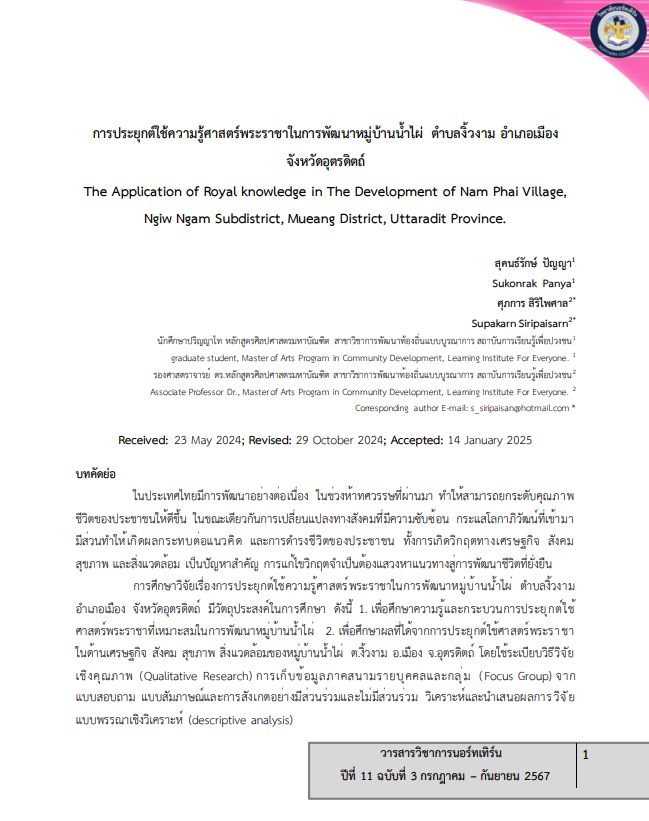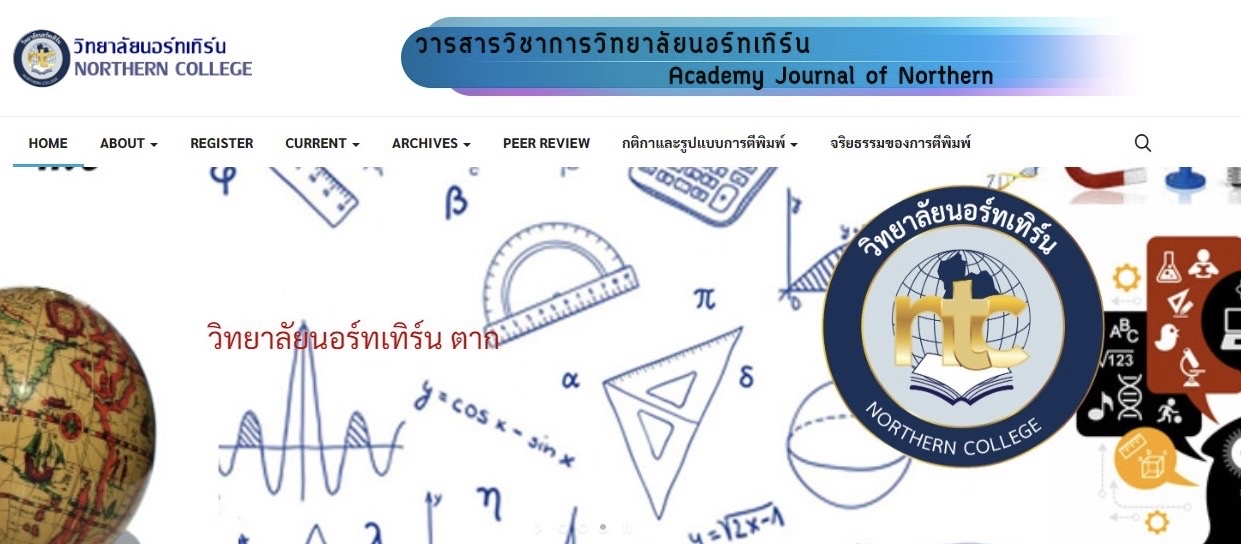The Application of Royal knowledge in The Development of Nam Phai Village, Ngiw Ngam Subdistrict, Mueang District, Uttaradit Province.
Keywords:
application of knowledge, royal science, developmentAbstract
In Thailand there is continuous development. Over the past five decades makes it possible to improve the quality of life of the people. At the same time, social changes are complex. Globalization. That comes in has an impact on the concept and the livelihood of the people including economic, social, health and environmental crises It's an important problem. Solving the crisis requires finding a path to sustainable life development.
The research study on the application of the royal knowledge in the development of Nam Phai Village, Ngiw Ngam Sub-district, Mueang District, Uttaradit Province has the following objectives: 1. To study the knowledge and process of applying the royal knowledge appropriately in the development of Nam Phai Village. 2. To study the results of applying the royal knowledge in terms of economy, society, health, and environment of Nam Phai Village, Ngiw Ngam Sub-district, Mueang District, Uttaradit Province, using qualitative research methods, collecting field data on individuals and groups (Focus Group) from questionnaires, interviews, and observations with and without participation, analyzing and presenting the research results in a descriptive analysis.
The research results found that villagers in Nam Phai Village community have knowledge and concepts in applying the royal knowledge in their lives in different ways, which can be divided into 3 main forms: 1) The original form that has been followed by ancestors who have been taught from generation to generation in household agriculture, such as growing vegetables in the family garden according to the concept of "planting everything you eat, eating everything you plant", meaning growing plants in their own area, using and sharing with neighbors, and processing the remaining into raw materials that can be collected. Then take some of the remaining to sell to generate income. 2) Application model from experience that used to have debt problems from monoculture and migrated to work in other areas. When returning to live by using the royal philosophy of sufficiency economy, plant organic, non-toxic plants to eat by yourself and have enough left to distribute. Use to treat diseases by planting vegetables for household consumption, reduce family illnesses, improve the soil, and start planting for trade, planting non-toxic vegetables as a career. 3)Knowledge supported by government agencies and other supporting agencies in the Khok Nong Na Model project using the royal philosophy according to the community development project and being a learning source, an example for people in the village and resulting in changes in the community, creating a learning process and awareness in the village, planting vegetables without using chemicals. The tangible changes at both the individual and community levels that occurred are as follows: 1) Villagers have better hygiene in their lives and overall health. 2) Villagers have more income to support themselves from household agriculture and processing agricultural products. 3) Villagers can solve problems of debt, informal debt, poverty, which have clearly decreased because people in the community have jobs, income to support themselves, use their own resources as a source of income by using the methods according to the philosophy of sufficiency economy and Khok Nong Na Model. 4) Crime and drug problems decreased because people have jobs. Having income, knowledge, and higher education gradually improves the quality of life.
References
จิฬาภรณ์ พยัคฆาภรณ์. (2555). การพัฒนาเศรษฐกิจชุมชนภายใต้ ปรัชญาเศรษฐกิจพอเพียง กรณีศึกษาชุมชนบ้านคลองฝรั่ง อำเภอไทรน้อย จังหวัดนนทบุรี. วิทยานิพนธ์ปริญญาศิลปศาสตรมหาบัณฑิต สาขาวิชาเศรษฐศาสตร์ บัณฑิตศึกษา มหาวิทยาลัยสุโขทัยธรรมาธิราช.
ธนาคารเพื่อการเกษตรและสหกรณ์การเกษตร. (2558). ธ.ก.ส.มุ่งสร้างความเข้มแข็งของภาคเกษตรไทย ตามหลักปรัชญาเศรษฐกิจพอเพียง. สืบค้นเมื่อ 25 พฤษภาคม 2565, จาก https://www.baac.or.th/th/content-news.php?content.
บรรณาธิการ. (2556). เศรษฐกิจพอเพียง. สืบค้นเมื่อ 20 พฤษภาคม 2565, จาก https://guru.sanook.com.
สุพัฒน์ ไพใหล. (2556). กระบวนทัศน์พัฒนา เพื่อการพึ่งตนเองของกลุ่มเครือข่ายอินแปง ในจังหวัดสกลนคร อุดรธานี. วารสารดุษฎีบัณฑิตทางสังคมศาสตร์ (ฉบับมนุษยศาสตรและสังคมศาสตร์) ปีที่ 3 ฉบับที่ 2 พฤษภาคม-สิงหาคม 2556. หน้า 37-50.
มหาวิทยาลัยเกษตรศาสตร์. (2560). ธ สถิตในใจชาวเกษตรศาสตร์ตราบชั่วนิรันดร์ พระมหากรุณาธิคุณของพระบาทสมเด็จพระปรมินทรมหาภูมิพลอดุลยเดช ที่มีต่อมหาวิทยาลัยเกษตรศาสตร์ (ตอนที่ 17). e news Kasetsart ฉบับที่ 72 วันที่ 14 กรกฎาคม 2560. หน้า 1.

Downloads
Published
How to Cite
Issue
Section
License

This work is licensed under a Creative Commons Attribution-NonCommercial-NoDerivatives 4.0 International License.






